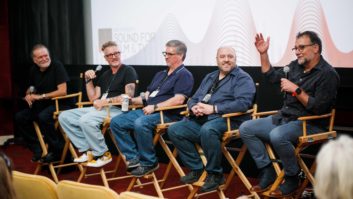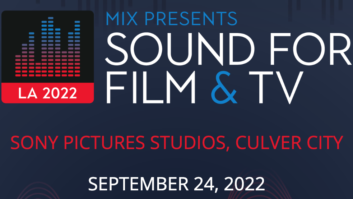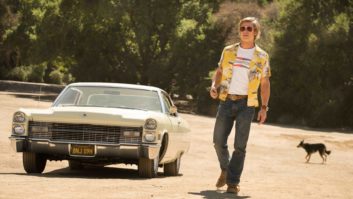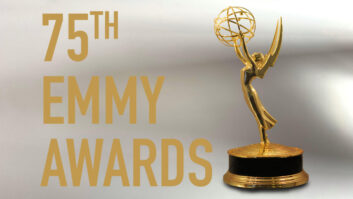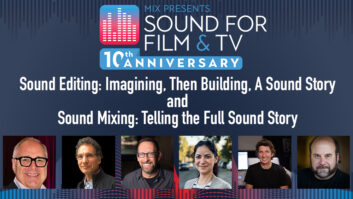
Matt Damon reprises his role as Jason Bourne in ‘The Bourne Ultimatum.’
Photo: Jasin Boland/Universal Pictures
Universal Pictures’ The Bourne Ultimatum was the big winner in the sound categories at the 80th Annual Academy Awards, presented February 24 at the Kodak Theatre in Hollywood. To learn about the Foley recording and sound editing techniques used in The Bourne Ultimatum, read Blair Jackson’s “Sound for Picture” story from Mix‘s August 2007 issue.
Creative talent from Ascent Media Group facilities received two Academy Awards for their contributions to The Bourne Ultimatum. Todd-AO re-recording mixers Scott Millan and David Parker won for Best Achievement in Sound Mixing, sharing the award with production mixer Kirk Francis. Supervising sound editors Per Hallberg and Karen Baker Landers from Soundelux won the Oscar for Best Achievement in Sound Editing.
This is Millan’s fourth Oscar win. He previously won for Ray, Gladiator and Apollo 13. He has also been nominated on three other occasions. It is Parker’s second Oscar; Parker previously won for The English Patient and has two other nominations. This is also the second Oscar for Hallberg, who previously won for Braveheart; he has one other nomination. This is Baker Landers’ first Academy Award.
In addition to winning their recent Academy Awards, Miller, Parker, Francis, Hallberg and Baker Landers each won the Best Sound award from the British Academy of Film and Television (BAFTA) for The Bourne Ultimatum.
Mix spoke with re-recording mixer Scott Millan following his most recent Academy Award.
How does it feel to win for The Bourne Ultimatum?
Well, it was very rewarding. It was even sweeter in that it was a shared award, in the sense that sound editorial won and picture editorial won. We worked very closely together through the mixing process, through the pre-dubs final—the whole soundtrack. Also, it was great because the sound editorial team and myself were onboard for all three of the Bourne projects [which include The Bourne Identity (2002) and The Bourne Supremacy (2004)], so that made it nice, as well, [in] that we were able to share [the wins] at the end of the third one.
The gentleman I work with, David Parker, mixes the sound effects, and I mix the dialog and the music. David and I have worked together as a team for a little over three years now. This is the first time we’ve won an Oscar together. We’ve independently been able to go and win awards previously, but this is the first time as a team we’ve been able to do this, so that was kind of rewarding for us, and it was a nice ribbon to tie it all up with.
All the work that was nominated last night was great work, and we were just the lucky benefactors of what transpired. But my hat’s off to all the nominees and anybody that has an interest in sharing in this. It’s a small community, and I think each of us respects the others.
How did this movie compare to the first two movies in the Bourne series?
They’re all challenging films, but one of the greatest challenges for us on this one was time. The post-production schedule was very, very compressed on this particular chapter of the story. We never had an opportunity to do a temp dub for our previous screening, so we never really had an opportunity to do any experimentation with how we wanted to address the mix this time. And they were shooting and cutting quite radically all the way through the process of prepping for the final mix, and then even into the final mix there was still a lot of cutting picture editorial and sound editorial going on. So it was a bit of a roller coaster, but very rewarding—a great group of people, and if you had to work under these sorts of pressures, it was the perfect assembly of individuals and a team effort.
Considering those circumstances, I imagine that makes this win more rewarding.
The storytelling of these films is kind of unique because there are a lot of flashbacks. But we also have the challenge of overlapping time a little bit, because from the second film to the third film there’s a bit of an overlap of storytelling, of time, and so to re-create and also be able to be clear enough to the audience—are we in real time, are we in linear time, are we in flashback time? And sound was instrumental, I think, in being able to help progress that part of the storytelling to give some clarity to the viewer.
The Foley in itself was a crucial element in this film. Mix published a story in the August 2007 issue about the Foley work behind The Bourne Identity.
As you know, it’s a very Foley-intensive project, and it’s very dense sonically—there’s a lot of sound in the film, there’s lots of transitions, lots of camera cuts, lots of motion and movement, and so it does create a necessity to perpetuate the energy without interruption and without [confusing] the audience. And manipulating the sound is quite deliberate. There’s a lot of music in the film, as well.
After we finished the film and literally signed off on the mix, we had a screening for cast and crew over at the Academy Theater. After a couple of days away from the film, to be able to sit there and watch it as a whole, it was almost the first time that I could really absorb the piece as a whole film. The way we had been so frantically working on it in reels and just trying to accomplish the goals of each day’s tasks, it was hard to see it as a whole. And after stepping back for about two or three days, there was no going back to change it, so thank goodness it did work. But having a couple of days away from it and then seeing it with an audience, and watching it play through, it is kind of a roller coaster ride—the whole film is. So to grab the audience from the very beginning and take them on this journey without creating any sort of sensory overload and having them turn off was a bit of a challenge, and we were very fortunate that it actually came off as good as we could probably hope it would.
It sounds like everything fell into place in just the right way.
Yes. Well, hats off to people like Chris Rouse, the picture editor, and John Powell, our composer, and, of course, our sound editorial crew and [stage tech] Drew Webster over at Todd-AO. We had multiple stages working consistently with each other trying to keep up with conforming of material and pre-dubs and picture, and then music editorial was perpetually working on the score, so there was a lot of experimentation [with] music. And so we had all hands on deck during the process with a lot of support there. And we were very fortunate because the way our facility is set up, we have five stages that could work in parallel with us. We work with a similar platform of consoles and automation, and we have redundancy between our stages, so that if we work on something in one room we can transfer that into another room and seamlessly continue that work. A great resource that we have is we can use one of our stages as a mixdown room for music. So Shawn Murphy, who is our scoring mixer, and Tom Carlson, our music editor, were able to actually mix down the music score in a room within a one-minute walk to my mixing stage, so we could continually have that line of communication and that access to each other’s materials. We had all cylinders going.
Matt Gallagher is an assistant editor at Mix.
